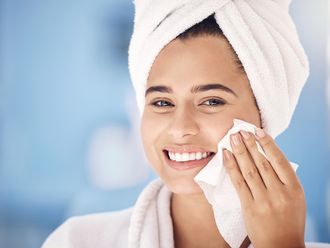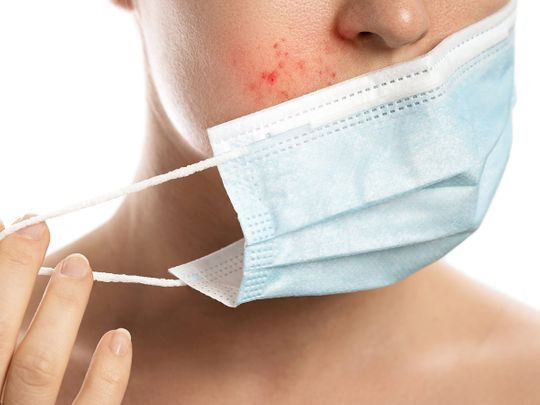
Wearing masks are the new normal and are an essential weapon against COVID-19, but it is also the cause of break-outs or pimples on the chin and jawline area. And it doesn’t look like masks are going to go away any time soon.
If you find yourself suffering from irritation and acne from wearing masks, you're not alone and mask-related breakouts are very much a real issue. This is known as 'maskne' or mask acne.
If you’re struggling with ‘maskne’ and can’t get rid of it? Gulf News interviewed two dermatologists and asked them for their tips and advice to help you out.
Dr Ikramullah Al Nasir, dermatologist and the managing director of DermaCare Clinic in Dubai, with over 15 years of experience, and Dr Anjali Mahto, a consultant dermatologist from the UK, with over 90,000 followers on Instagram and author of the bestselling book, 'The Skincare Bible'.
Decoding ‘maskne’
In 2020, skincare experts and dermatologists coined the word 'maskne', but this is not an entirely new phenomenon. 'Maskne' is a form of acne mechanica, and it is caused by frequent friction or pressure against the skin. Acne mechanica is different from acne vulgaris, which is caused by hormonal issues.
Acne Mechanica is triggered by external problems such as heat, friction, bacteria and pressure. Saliva and heat that is trapped within your mask and concentrated in specific areas, such as nose, chin, and jawline, is teeming with bacteria and therefore leads to mask-induced acne.
Dr Nasir explained: “This type of acne is caused by occlusion or friction against the skin surface that leads to skin irritation in the short term. Over time, continued friction leads to inflammation that can block pores and leads to breakouts. The moisture and sweat caused by humidity from heat or sweat trapped on the skin when wearing masks for an extended period can also contribute to this breakout. Maskne related breakouts usually affect the areas covered by the face mask – the jaw, cheeks, nose, chin and around the mouth. Before the COVID-19 pandemic, the athletes who wore helmets were most frequently afflicted with this condition.”
Tight leggings and bike shorts, and helmets pressed against your skin are examples of acne mechanica and is frequently seen in American footballers. Doctors and nurses who have to wear N95 masks and PPE kits all day in claustrophobic and stressful environments have also reported an uptick in skin irritations and redness.
Dr Anjali Mahto also added that masks just don’t cause acne breakouts but can also lead to other serious skincare allergic reactions and issues. She told gulfnews.com: “At the other extreme, itch and rash are possible due to irritant eczema from mask components. There have also been reported cases of allergy to mask adhesives or components such as rubber straps. In these circumstances, the skin will appear red, inflamed, scaly and flaky. Lastly, direct pressure-related effects are also common, resulting in redness (often across the nasal bridge) and skin maceration.”
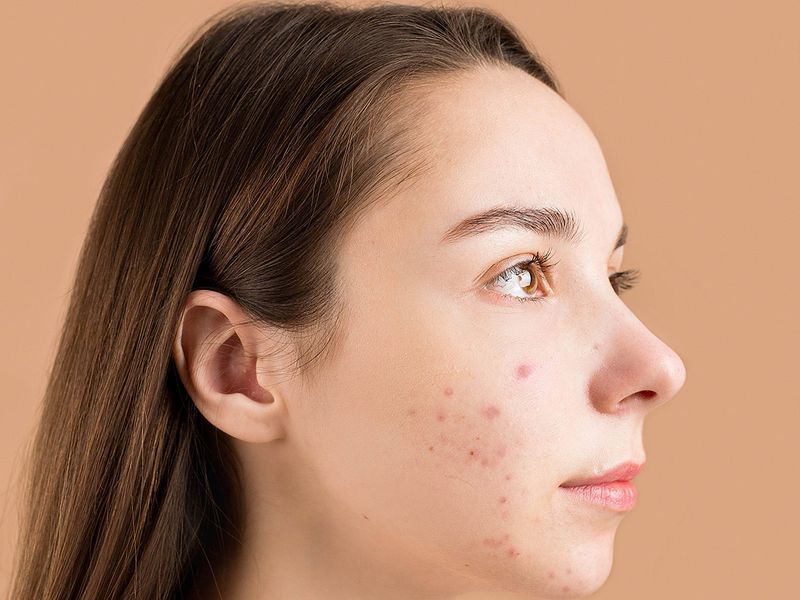
Risk factors that contribute to 'maskne'
The moisture, saliva and humidity under masks become a breeding ground for bacteria. Dr Nasir warns that bacteria flourishes in hot and humid weather and can even aggravate pre-existing skin conditions. He said: “When you breathe or talk, your mask tends to trap a lot of hot air. This hot air creates a humid environment – an ideal setting for bacteria, yeast and other flora, such as Demodex folliculorum (type of skin mite) to grow excessively. The overactivity of these ‘germs’ can either cause or worsen the pre-existing acne/folliculitis, seborrheic dermatitis, rosacea and perioral dermatitis on the face.”

Maskne related breakouts usually affect the areas covered by the face mask – the jaw, cheeks, nose, chin and around the mouth. Before the COVID-19 pandemic, the athletes who wore helmets were most frequently afflicted with this condition.
Here are some risk factors that can trigger ‘maskne’ according to Dr Nasir:
- • Make-up: Wearing make-up under your face mask increases the chances for clogged pores and causes acne flare-ups. If you do wear make-up use a gentle cleanser or micellar water to remove the make-up.
- • Humidity: In the increased temperature and moisture in the air during the summer months, people are much more likely to experience breakouts. Heat and humidity can make breakouts more severe. This can lead to deeper, more painful pimples, including large papules, pustules, nodules and even cyst formation. But, unfortunately, even cold and dry weather doesn't provide relief from mask irritation. During the winter, your skin suffers from dryness, and the friction from the mask removes the skin's natural oil barrier. The dryness and constant friction cause your skin to break out, and hair follicles can open instead of clogging. This can lead to Folliculitis, a bacterial infection of the hair follicles. Along with this, your surrounding pores are clogged, and shedding of dry skin also occurs.
- • Stress: It increases the production of cortisol, prolactin and other hormones. This spike in hormone production impacts the immune system, and when our immune system is compromised, the body starts rerouting its resources away from the skin. This, therefore, affects overall skin health.
- Sunscreens: Sunscreen is crucial, but it needs to be applied every day, but this added layer of production can also contribute to irritated skin.
- Moisturisers: The issue is not necessarily with moisturisers but the type used. Both the moisturiser and the sunscreen should have a lightweight formula to prevent your pores from getting clogged underneath your mask. Hydration is key when it comes to getting rid of maskne.
For makeup enthusiasts, skipping makeup is non-negotiable. But try adopting a less is more philosophy when it comes to makeup. Dr Mahto advises avoiding heavy full coverage foundation and try to incorporate a lighter base of make-up.
If you want to apply make-up, try spot concealing your blemishes, add some cream blush for a rosy glow and a hydrating lip balm to finish it off. Instead, emphasise the eyes, play around the fun and bold looks or enhance your eye colour and shape.
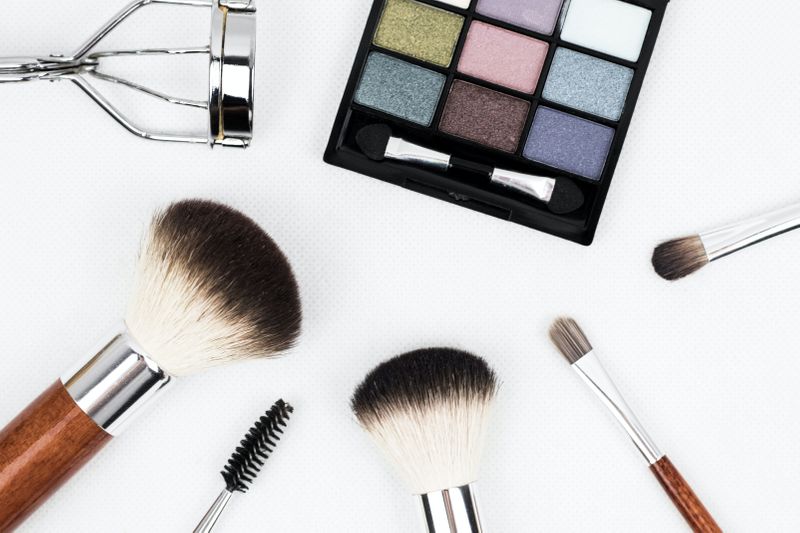
The dos and don’ts to beat ‘maskne’
Curing ‘maskne’ is tricky. You can’t stop wearing your mask because you’re having break-outs from it. But there are measures you can take to mitigate mask-related skin issues.
Lay off the exfoliants and stay away from harsh products
People suffering from acne are usually on topical medications such as retinol, BHA, AHA and benzoyl peroxide. But using these ingredients and wearing your mask can sensitise your skin. Dr Nasir recommends switching up your skincare routine. He said: "If you want to continue with your retinol, Alpha-hydroxy acids (AHAs) and other skin treatments, consider applying these products only at night when you are done wearing your mask for the day.”
Some people apply disinfectant spray on their masks before using them. But Dr Nasir advises against it. “Spraying the sanitizer inside your mask is never a good idea. It can cause significant skin irritation,” he said.
Dr Mahto encourages people to stay away from fragrances and harsh exfoliators.
“Stick to unscented or fragrance-free cleansers - if your skin is oily and acne-prone then go for a foaming cleanser. If your skin is dry, irritated and sensitive, then opt for a cream cleanser and ensure you stick to cleansing twice daily. If your skin is experiencing irritation as a result of wearing a mask, then avoid physical scrubs or exfoliators which can further damage the skin surface due to excessive removal of dead skin cells."

At the other extreme, itch and rash are possible due to irritant eczema from mask components. There have also been reported cases of allergy to mask adhesives or components such as rubber straps. In these circumstances, the skin will appear red, inflamed, scaly and flaky. Lastly, direct pressure-related effects are also common, resulting in redness (often across the nasal bridge) and skin maceration.
Take a break
Both Dr Mahto and Dr Nasir agree that taking a mask break can help alleviate irritation. Dr Nasir said: “Take 15 minutes mask-free break every 4 hours whenever safe and possible.”
Clean your mask
Dr Nasir suggests cleaning your re-usable masks frequently to reduce breakouts, but it is also important for infection control. “Use hypoallergenic cloth detergent to wash your mask as residue from this product can also irritate the skin, and pay extra attention while you're wearing a mask. Make a change right away when you notice irritation, excess moisture, pain or other concerns.”
He also recommends wearing a lightweight mask made from cotton and avoid masks made from nylon or rayon. This material can irritate the skin.
Minimalise your skincare routine
It's easy to go overboard with your skincare routine and go on a shopping spree to find new products to cure your maskne. Most of us use way too many products in our skincare, and that does more harm than good. Adopting a basic skincare routine that includes a gentle fragrance-free cleanser, and a lightweight non-comodogenic moisturiser is essential in fighting against those pesky pimples plaguing our lives.
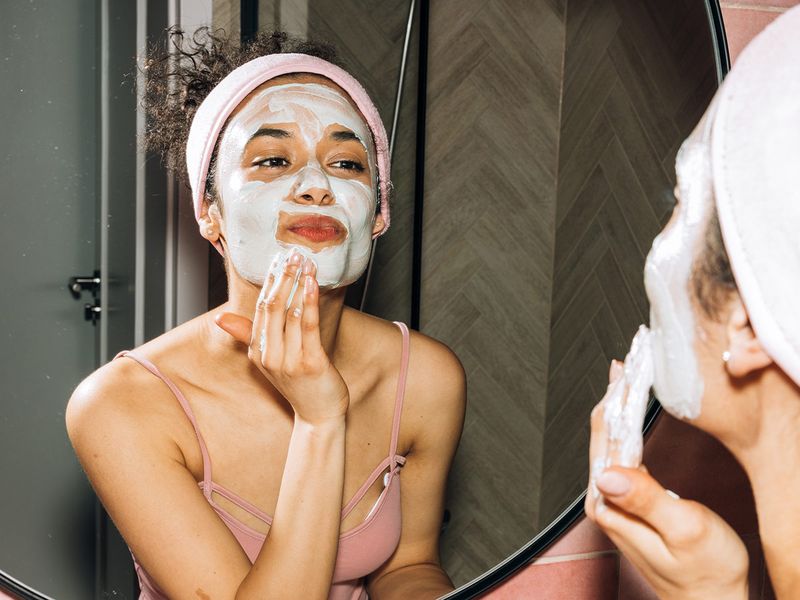
Both the dermatologists have provided a step-by-step skincare routine for ‘maskne’
Dr Nasir’s skincare routine advice -
- The more products applied to the skin, the more likely you are to experience irritations and breakouts.
- Use a gentle cleanser to wash your face in the morning and evening.
- Apply a fragrance-free moisturiser regularly.
- Use a suitable sunscreen medically suggested for your skin type.
- When possible, find a light moisturiser for the face that has sunscreen built in to further reduce the number of products.
- Check your ingredient list for your oils, fragrances and other ingredients that could raise potential concerns.
- Consult with a dermatologist for personalised skincare recommendations.
- Medicated topicals can help, but you will need to consult a dermatologist before considering that route.
“A few weeks course of oral antibiotic together with topicals such as; benzoyl peroxide, clindamycin, tretinoin, erythromycin and others can be a part of the prescription. Use of gentle face cleansers can complement the above medical treatment,” added Dr Nasir.
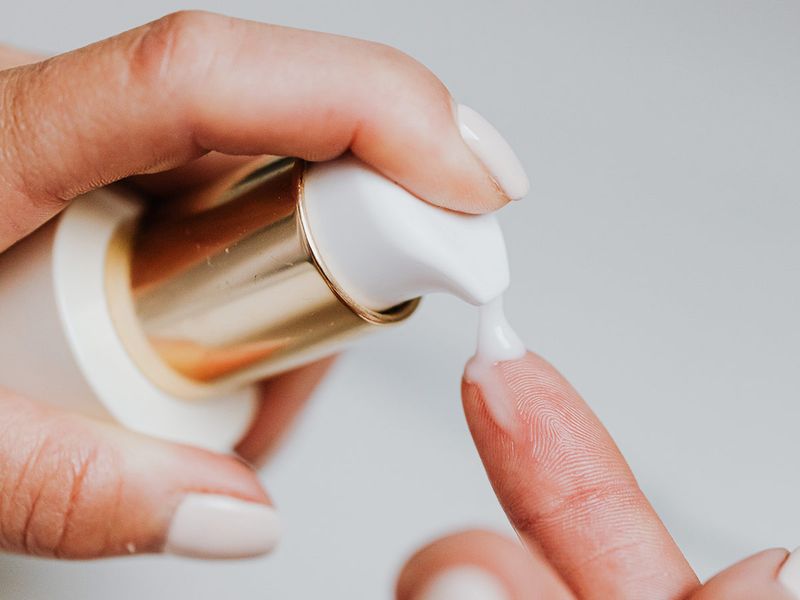
Dr Mahto laid out two separate skincare routines for people suffering from mask acne and mask rashes.
For mask acne flare-ups:
- Use a face wash with salicylic acid (such as La Roche Posay Effaclar foaming wash, Medik8 clarifying foam).
- Use targeted spot treatment (such as Murad blemish control) or a salicylic acid toner after cleansing (such as Paula's choice 2% liquid exfoliant).
- Apply a fragrance-free, non-comedogenic moisturiser.
- If there is no improvement, seek medical attention for prescription agents, such as topicals including Epiduo (retinoid and benzoyl peroxide) or adapalene.
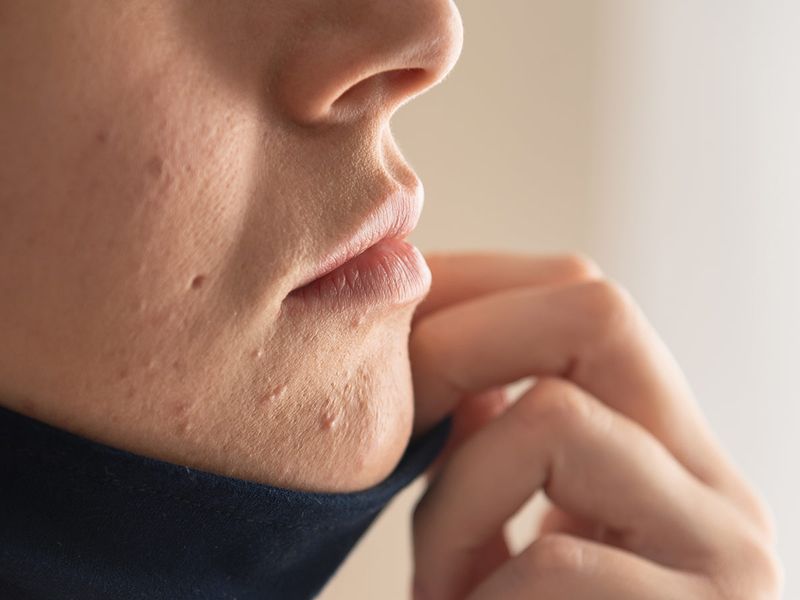
For eczema and rashes developed from masks -
- Use unscented facial cleansers designed for sensitive skin (such as La Roche Posay Toleriane Cleanser or Cerave hydrating cleanser).
- Make use of barrier creams (such as Aquaphor healing ointment or vaseline) overnight on any broken or macerated areas of skin as an occlusive.
- Use fragrance-free moisturisers (ex, Cetaphil hydrating moisturiser or Avene skin recovery cream) on the rest of the skin twice daily to prevent water loss and improve the barrier function of the skin.
- Purchase some over the counter eumovate cream 0.05% (mild steroid) and apply to itchy, inflamed skin twice daily for seven days, after checking with your dermatologist.
- Avoid harsh scrubs or chemical exfoliators if the skin is red or sensitive as this might worsen eczema. Take a break from these and retinol, which may otherwise form part of your regular skincare routine whilst there is a facial rash present.
Advice for healthcare professionals
Healthcare professionals mostly use N95 masks and are working in high-risk environments. A study conducted by two Bulgarian dermatologists in 2020 found that skin conditions such as erythema, papules, maceration, and scaling were the most commonly reported skin changes caused by extended wear of PPE (personal protective equipment) kits. The study pointed out that more than one-third of healthcare workers complained of acne, facial itching and dermatitis from wearing an N95 mask.
Dr Anjali Mahto said that there is limited scientific data for the dermatological issues healthcare workers are facing. “Much of the information we have comes from the SARS outbreak in 2003 and PPE use at the time, in particular N95 masks,” she said.
“Prolonged contact to PPE and mask-wearing can lead to many recognised skin problems including - pressure injury, contact dermatitis or eczema, itch, pressure urticaria (or hives) an exacerbation of acne.”
Dr Mahto suggests using barrier creams and petroleum jelly as an occlusive to the affected areas, but she also cautioned: “Healthcare professionals wearing PPE do not do this immediately before fitting your mask as it may affect the quality of the seal.”
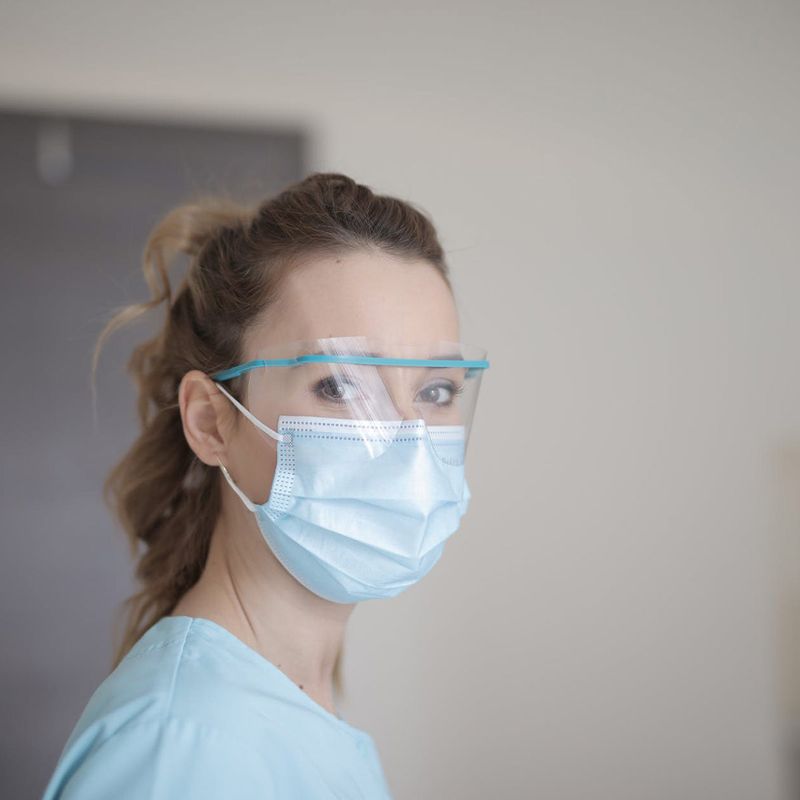
Ditching your mask is not the solution to maskne. Maskne does not mean you need a complete skincare routine overhaul. Reassessing your skincare routine and making a few tweaks to it is all you need to do to keep it under control. You can get away with camouflaging your blemishes with a pimple patch under your mask.
Maskne has also made us self-conscious of our face underneath the mask. But it's comforting to know that this issue is common, and you're not the only one suffering from it. Take solace and comfort in the fact that millions of others are on the same journey as you.




